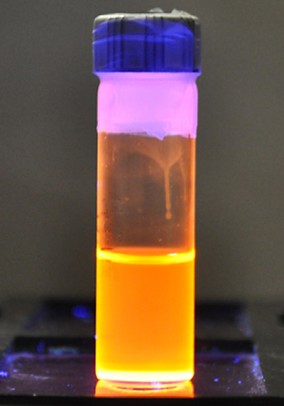Perfectly doped quantum dots yield colors to dye for
Quantum dots are tiny nanocrystals with extraordinary optical and electrical properties with possible uses in dye production, bioimaging, and solar energy production. Researchers at the University of Illinois at Chicago have developed a way to introduce precisely four copper ions into each and every quantum dot.
The introduction of these “guest” ions, called doping, opens up possibilities for fine-tuning the optical properties of the quantum dots and producing spectacular colors.
“When the crystallinity is perfect, the quantum dots do something that no one expected–they become very emissive and end up being the world’s best dye,” says Preston Snee, assistant professor of chemistry at UIC and principal investigator on the study.
The results are reported in the journal ACS Nano, available online in advance of print publication.
Incorporating guest ions into the crystal lattice can be very challenging, says UIC graduate student Ali Jawaid, first author of the paper.
Controlling the number of ions in each quantum dot is tricky. Merely targeting an average number of guest ions will not produce quantum dots with optimal electrical and optical properties.
Jawaid developed a procedure that reliably produces perfect quantum dots, each doped with exactly four copper ions. Snee believes the method will enable them to substitute other guest ions with the same consistent results.
“This opens up the opportunity to study a wide array of doped quantum dot systems,” he said.
Donald Wink and Leah Page of UIC and Soma Chattopadhyay of Argonne National Laboratory also contributed to the study.
Support for the research came from UIC and the UIC Chancellor’s Discovery Fund and the American Chemical Society Petroleum Research Fund. The Materials Research Collaborative Access Team, a consortium for building and operating x-ray beamlines at Argonne’s Advanced Photon Source, is supported by the U.S. Department of Energy and the MRCAT member institutions. The use of the Advanced Photon Source was supported by the DOE Office of Basic Energy Sciences under contract DE-QC02-06CH11357.

